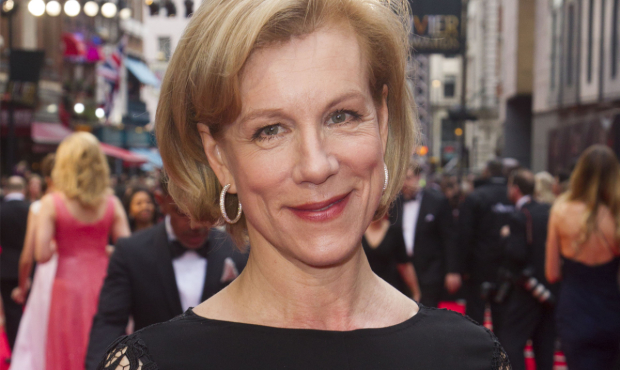Juliet Stevenson: 'Women in theatre are not allowed to fail'
Ahead of the West End transfer of the Almeida’s ”Hamlet” we talk to the Olivier Award-winning actress about playing Gertrude and female roles in Shakespeare

© Dan Wooller for WhatsOnStage
After starring alongside Lia Williams in Robert Icke's acclaimed coin-flipping production of Mary Stuart, Juliet Stevenson went straight back to the Almeida to play Gertrude in Icke's Hamlet – a role she swore she'd never play. As the production transfers to London's West End, we speak to Stevenson about how she ended up playing the role, why Shakespeare is so bad at writing women, and her thoughts on Emma Rice and Shakespeare's Globe.
What appealed to you about this production of Hamlet?
It was Robert Icke. I never really wanted to play Gertrude. I've been asked before and said 'no thanks', because I always thought she's one of those many Shakespeare women who is very underwritten. Shakespeare's interestingly ruthless, a character in his play will serve the need of the narrative. Very often if you're a woman, especially beyond the age of 40, that can have very limited scope. A huge amount of things happen to Gertrude but she has relatively little text. In the end I said I'd do it as long as we can frame the silence of Gertrude and Ophelia, their silence needs to be part of our thinking about this world that we're in.
Do you think Shakespeare had a problem with writing female parts?
The characters in Shakespeare over the age of 40 are really sparse and very two dimensionally written, unless you really invest in them. I think it's partly because Shakespeare had no women in his company. We know that the roles in his plays were developed by the actors who he worked with all the time, but if you've only got 12 year old boys playing women, they're not going to have any expertise to bring to bear.
People wouldn't stand for that if this was written today, would they?
Absolutely. I often say that if this was a new play you'd get dramaturgs and directors saying 'it's a great play, but we have to hear from her.' What her pitch on that marriage was, why she's done what she has, otherwise she's just going to be judged without being understood. Being judged and not understood is such a banner for so many women's roles. When I was younger playing Cressida in Troilus and Cressida and Isabella in Measure for Measure, I was walking into the mould of a character who had been so judged. The fascination for me was taking away the judgements about her – like Cressida's a whore and Isabella is frigid because she won't sleep with Angelo – let's look at why these women are making these choices. What power do they have? What do they not have? The interesting question is always why.
With all that in mind, what do you make of the work that Emma Rice has done at the Globe?
Like many people, I was very upset by the firing of Emma Rice. She seemed to me to have some terrific ideas and the fact that she wanted to shake things up there would absolutely have my vote. Tourists may love the the Globe as a museum, but that is of no interest to me, I'm really only interested in how the plays speak to now, and they do, vividly!
I think the truth is that women aren't allowed to fail – not that she did fail – but it really does remain true that as a women, if you don't 'succeed', you'll be given a very short shrift. Whereas there are male directors that have worked constantly in the West End who have a list of flops on their CV, but it doesn't affect their career. Women are given much shorter rope.
Presumably that vacancy wouldn't be interesting to you then?
Oh my god no. I don't want to run a building, god no. I can't stand meetings. I go on stage to escape, I wouldn't go into a theatre to find myself having meetings.
You said a while back that West End ticket prices were making theatre inaccessible. How important was it to you that this production had so many tickets for young people at affordable prices?
Massively. I know we shouldn't care who we are playing to but we do, you just can't help it. The most thrilling week we had at the Almeida was the 'Hamlet for free' week, where we had the whole theatre packed with kids, many of whom had never seen a Shakespeare play before, or even been to the theatre before. I didn't think they'd be interested in me, a middle-aged women who's an anguished mum having an affair – but actually they were incredible. They went wherever the play went, listened like hawks and were so receptive. It was a thrilling week.
I remember when I was 15 and saw my first Shakespeare play and my whole world just changed. The language, the thinking, the scale of the feelings, it just blew my mind and all these doors flew open. It was so exciting to think that we might be doing that for a bunch of young people.
Hamlet runs at the Harold Pinter Theatre until 2 September 2017.
Click here to book tickets for Hamlet















